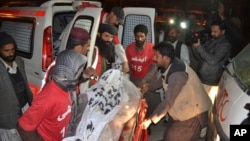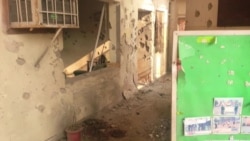Pakistan has intensified counterterrorism security operations near the border with Afghanistan, killing scores of Islamist militants since Tuesday’s school massacre that left 149 people dead, most of them children.
A top Pakistani official said evidence suggesting the attackers were in contact with “elements” on the Afghan side of the border had been shared with Kabul for a coordinated action against the perpetrators.
The Pakistani military’s media wing said 32 insurgents were killed when troops ambushed them at two sites in the northwestern Khyber district, where the Pakistani Taliban are believed to have bases. It added that forces killed another 18 insurgents in a separate raid in the tribal area on the Afghan border.
Authorities said security forces killed eight Taliban militants, including an important commander, in southwestern Baluchistan province, which also borders Afghanistan. Several other raids were conducted elsewhere in the country.
Pakistan observed a third day of mourning Friday for the school massacre victims. Peaceful rallies were organized that demanded tougher action against the Islamist Taliban, which claimed responsibility for the killings at the army-run school in Peshawar.
Related video: VOA's Ayaz Gul tours devastated Peshawar school:
Information shared with Kabul
Pakistan's adviser on national security and foreign policy, Sartaj Aziz, reiterated Friday that the militants had links to “elements” on the Afghan side of the border. He said Pakistan's army chief and the head of its spy agency rushed to Kabul a day after the attack with the information, and the Afghan president promised to take action.
“We had evidence that when the attack was going on in Peshawar, they [the attackers] were in contact with some elements across the [Afghan] border," Aziz said.
"This evidence was provided [to Afghan officials], and I think we have now developing mechanisms both for border management, intelligence-to-intelligence cooperation and interaction, and military-to-military interaction … and the [Pakistan] army chief shared that evidence requesting them to take this coordinated action,” he said.
Aziz said that since the visit to Pakistan of Afghan President Ashraf Ghani in November, security relations between their countries' armies and intelligence agencies have been improving and they are moving to tackle the problem of terrorism jointly. He said that Kabul and Islamabad were also developing mechanisms for border management.
Meanwhile, participants in a candlelight vigil in the Pakistani capital, including civil society activists, expressed their feelings about the deadly school attack. One woman said that "it is really, really like grieving for own children. It could not have been more cruel ... and it is also anger at ourselves because we allowed this kind of mindset to take root in our society.”
Lack of humanity
College students participated in the rally, a majority of them young women helping to light the candles.
“Even when you are raising your hand on a child, I feel you should think 10 times," one female student said, "but when you are killing the child, taking his life away, that he is never going to get that back. So ... the humanity definitely was not there."
The mass slaughter of children by seven suicide attackers also shocked and outraged the world. International leaders, led by U.N. Secretary-General Ban Ki-moon, expressed their condemnation of the attack.
The school attack prompted Prime Minister Nawaz Sharif to lift the unofficial moratorium on the death penalty to allow for the execution of people convicted on terrorism charges. The move has angered human rights advocates, who are demanding its reversal, reiterating skepticism about the fairness of trial proceedings in Pakistan.
A day after the prime minister’s announcement, authorities executed what they described two “hard-core terrorists” in a central Pakistani jail. The men, identified as Dr. Usman and Arshad Mehmood, were tried and sentenced to death by a military court for plotting attacks on the army headquarters and assassination attempts on former President Pervez Musharraf.






